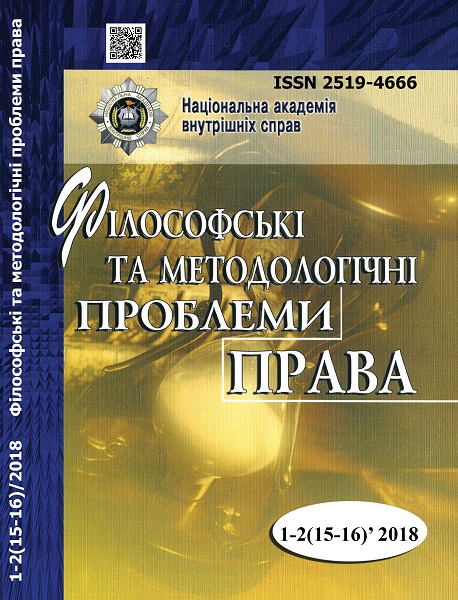Transformation of the Ideological Basics of the Ancient Greek Justice during Dorian Period
Abstract
Based on the axiological analysis of various ontological processes that took place on the territory of Ancient Greece at the time of Dorian invasion, the article under discussion deals with the issue of the evolution of the Ancient Greek system of justice. Taking into account the results of the research of different existential circumstances, reflected in the texts of certain historical-legal documents of the period under studies, the author of the article makes some gnosiological suggestions and conclusions regarding the impact of «Dorian Factor» on the processes of evolution of Ancient Greek justice, as well as on other institutions of state power. It is worth mentioning that the peculiarities of the latter affect still preserve their importance and relevance in the development and functioning of judicial systems in democratic states. The article points at the fact that the invasion of Dorian tribes (which, despite their ethnic Greek origin, were at a considerably lower stage of development than Achaeans, who represented Mycenaean civilization) has completely ruined the political system, created by Achaeans. The boost of violence has destroyed agriculture and marine commercial ties. The war was progressing, causing extreme poverty of the population. However, the leading institutions of state power kept developing and acquiring new evolutionary features even under such negative circumstances. A good example of this is the Athenian Polis at the times of Codrʼs reign. Gradually, the lifetime power of the Athenian kings has been substituted with that of the elected archon, who ruled individually at first, and later on – collectively, with the help of three other democratically elected archons. Among the authorities, granted to archons, particular emphasis should be laid on the judicial branch of power. It mostly belonged to the archon-judge, which proves the emergence in Athens of a rather primitive institution of the power separation. Later, due to the development of social relations and, respectively, because of the growth of the responsibilities
of judiciary in Athens, the number of the archon-judges has increased to six. This, in its turn, has led not only to the decrease of liabilities for those who administered justice, but also enabled them to react immediately to the facts of social being, which always required ontological regulation on the basis of a trial. Thus, quite surprisingly, the Dorian invasion did not cause the decay of the institutions of state power in Athens. On the contrary, it has stimulated their gradual development, particularly that of the judicial branch of power.
Downloads
Abstract views: 162 PDF Downloads: 144
Copyright (c) 2019 Philosophical and Methodological Problems of Law

This work is licensed under a Creative Commons Attribution-NonCommercial-NoDerivatives 4.0 International License.
- Authors reserve the right to authorship of their own work and transfer to the magazine the right of the first publication of this work under the terms of the Creative Commons Attribution License, which allows other persons to freely distribute published work with mandatory reference to authors of the original work and the first publication of an article in this magazine.
- Authors have the right to enter into separate additional agreements on non-exclusive dissemination of the work in the form in which it was published in the journal (for example, to post an article in the institution's repository or to publish as part of a monograph), provided that the link to the first publication of the work in this journal is maintained.
- The journal's policy allows and encourages the posting of articles by authors on the Internet (for example, in electronic storehouses of institutions or on personal websites), both before the submission of this manuscript to the editorial office and during its editorial processing, as this contributes to the creation of a productive scientific discussion and positively affects the efficiency and dynamics of citing the published work.




